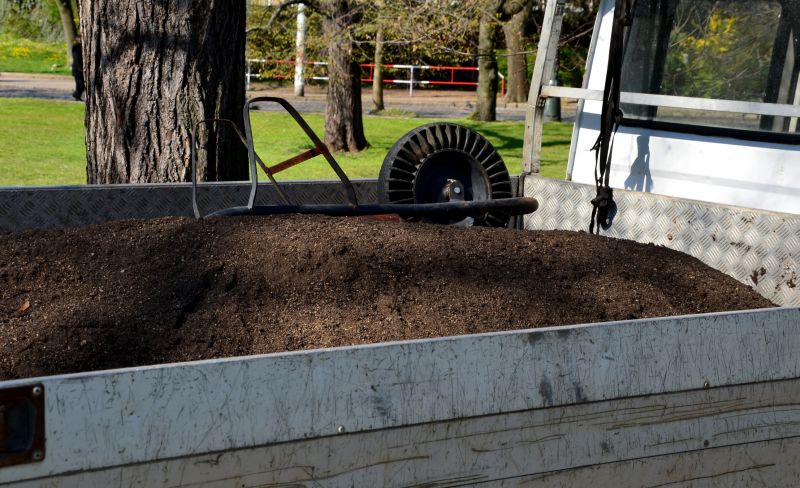Popular Equipment For Seamless Loam Delivery Solutions
Discover the most sought-after products that enhance the efficiency and accuracy of your loam delivery operations.
 When it comes to delivering loam for gardening, landscaping, or construction projects, selecting the right products can significantly influence the efficiency and ease of the process. Loam, being a vital soil mixture, often requires specialized handling and transportation solutions to maintain its quality and ensure proper application. Whether you're a professional landscaper or a dedicated home gardener, understanding the variety of products available for loam deliveries can help you make informed decisions tailored to your specific needs.
When it comes to delivering loam for gardening, landscaping, or construction projects, selecting the right products can significantly influence the efficiency and ease of the process. Loam, being a vital soil mixture, often requires specialized handling and transportation solutions to maintain its quality and ensure proper application. Whether you're a professional landscaper or a dedicated home gardener, understanding the variety of products available for loam deliveries can help you make informed decisions tailored to your specific needs.
Top Overall Option
Heavy-Duty Soil Cart
A robust soil cart designed to handle the weight and bulk of loam, featuring reinforced wheels, a durable frame, and ergonomic handles for easy maneuverability. Ideal for transporting large quantities of loam across various terrains, this product can streamline the delivery process and reduce physical effort.
Types of Products For Loam Deliveries
Wheelbarrows
Traditional wheelbarrows remain a versatile choice for small to medium loam loads, offering ease of use and maneuverability.
Garden Carts
Multi-purpose carts with larger capacities, suitable for transporting loam over short distances within gardens or yards.
Dump Trailers
Heavy-duty trailers that can be attached to vehicles for transporting large quantities of loam across longer distances.
Soil Spreaders
Specialized tools designed to evenly distribute loam over designated areas, improving application efficiency.
Bulk Bags
Large, durable bags that can hold significant amounts of loam, making loading and unloading easier.
Skid Steer Attachments
Compact attachments for skid steers and loaders that facilitate quick loading, transporting, and spreading of loam.
Transport Totes
Stackable, wheeled containers that simplify moving loam in smaller quantities within work sites.
Leveling Rakes
Tools used to spread and level loam after delivery, ensuring an even surface for planting or construction.
Soil Spreaders
Motorized or manual devices designed to distribute loam uniformly across large areas.
Portable Conveyors
Equipment that helps move loam from delivery trucks to designated locations with minimal manual effort.
Loading Buckets
Attachments for loaders and excavators that facilitate quick scooping and loading of loam.
Wheelbarrow Liners
Protective liners that prevent soil spillage and make cleaning easier after use.
Soil Leveling Boards
Long, flat tools used to spread and smooth out loam for even coverage.
Pickup Bed Liners
Durable liners that protect truck beds when transporting loam, preventing damage and spillage.
Hydraulic Lift Tables
Equipment to elevate and position loam loads for easier spreading and distribution.
Sifting Screens
Tools used to remove debris from loam before delivery or application, ensuring a clean, uniform soil.
Popular Choices
Widely used for small-scale loam transport, offering durability and maneuverability.
Popular for yard work and landscaping projects requiring moderate amounts of loam.
Preferred for transporting large quantities over longer distances efficiently.
Trending for their ability to evenly distribute loam quickly across large areas.
Favored for their convenience in handling and storing significant loam quantities.
Popular for professional landscaping and construction projects requiring quick loading and spreading.
Increasingly used to streamline the transfer of loam from trucks to sites.
Commonly utilized to achieve smooth, even surfaces after loam delivery.
Valued for reducing physical strain during heavy lifting and placement tasks.
Popular for ensuring clean, debris-free loam before application.
Proper transportation tools, such as durable wheelbarrows, heavy-duty carts, and specialized soil movers, are essential for managing loam effectively. These products are designed to handle the weight and consistency of loam, making the transfer from delivery vehicle to the designated area smoother and less labor-intensive. Additionally, accessories like tarps, covers, and containment bins can help protect the loam during transit and storage, preserving its quality until it is ready to be spread.
The process of delivering loam often involves multiple steps, including loading, transporting, and spreading. Equipment that facilitates each of these stages—such as adjustable spreaders, leveling tools, and compact loaders—can streamline the workflow. Choosing products that are compatible with various delivery scenarios ensures versatility and efficiency, whether working on small garden beds or large landscaping projects.
Investing in the right products for loam deliveries not only improves productivity but also minimizes waste and potential damage to the soil. By selecting reliable, well-designed tools and accessories, users can optimize their workflow, reduce physical strain, and achieve more consistent results. Carefully considering the specific requirements of your project will help you identify the most suitable products, ensuring a smooth and successful loam delivery process.
Key Buying Considerations
- Capacity requirements based on project size and scope.
- Durability of materials to withstand heavy loads and frequent use.
- Ease of maneuverability, especially for manual tools like wheelbarrows and carts.
- Compatibility with existing equipment such as loaders or tractors.
- Type of terrain where the products will be used, including rough or uneven surfaces.
- Ease of loading and unloading to optimize workflow efficiency.
- Protection features like covers or liners to prevent spillage or contamination.
- Mobility features such as wheels, handles, or attachments for ease of transport.
- Maintenance requirements and ease of cleaning after use.
- Budget constraints balanced with quality and durability.
- Versatility of the product for different types of soil or other materials.
- Storage considerations when not in use, especially for larger equipment.
- Safety features to prevent accidents during handling and transport.
- Compatibility with delivery vehicles or existing site infrastructure.
- Environmental conditions, including exposure to moisture or weather elements.
